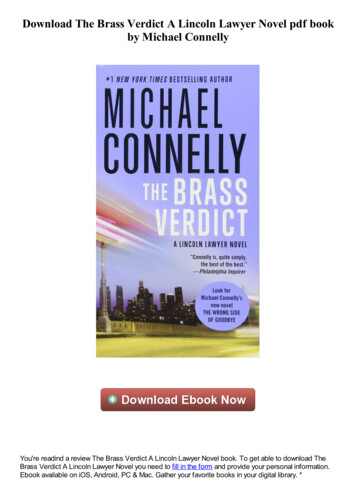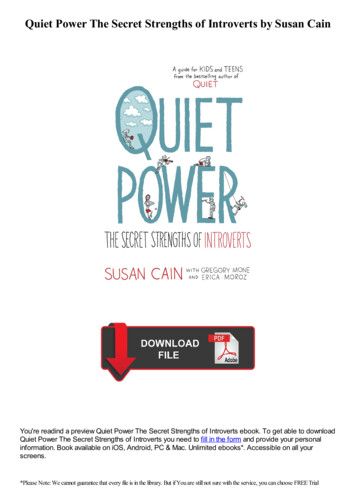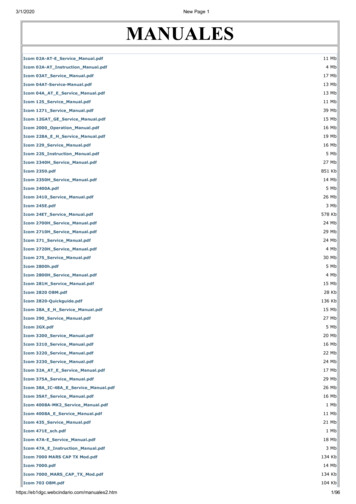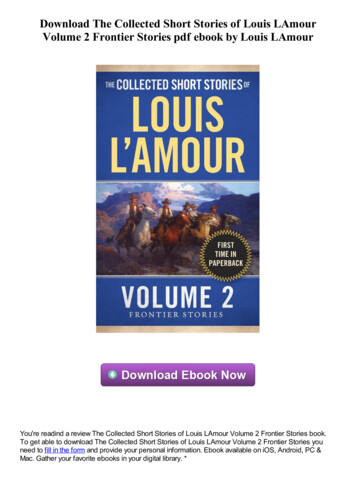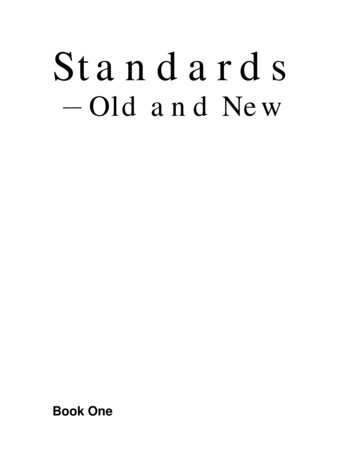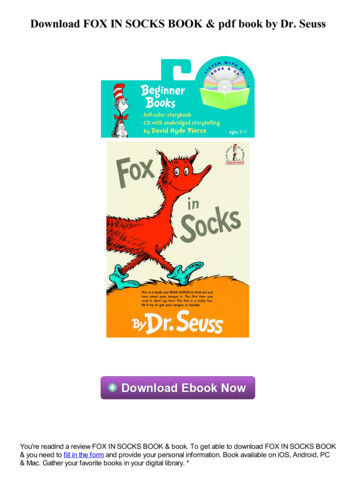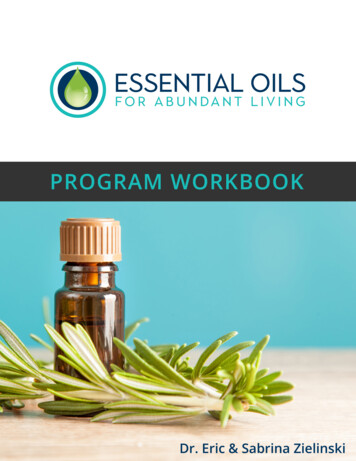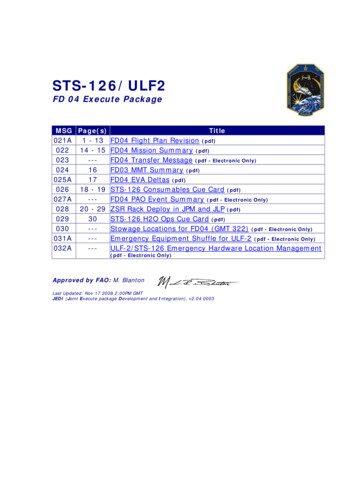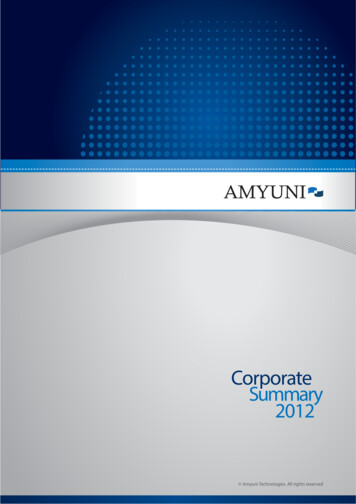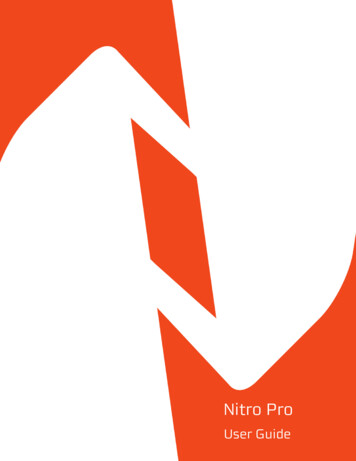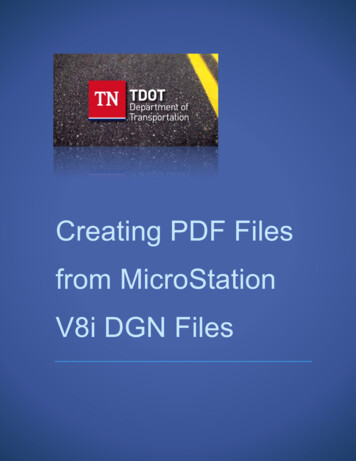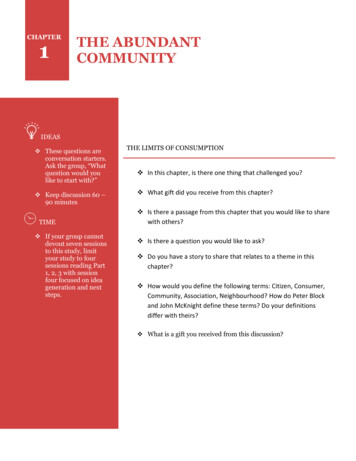
Transcription
CHAPTER1THE ABUNDANTCOMMUNITYIDEAS These questions areconversation starters.Ask the group, “Whatquestion would youlike to start with?” Keep discussion 60 –90 minutesTIME If your group cannotdevout seven sessionsto this study, limityour study to foursessions reading Part1, 2, 3 with sessionfour focused on ideageneration and nextsteps.THE LIMITS OF CONSUMPTION In this chapter, is there one thing that challenged you? What gift did you receive from this chapter? Is there a passage from this chapter that you would like to sharewith others? Is there a question you would like to ask? Do you have a story to share that relates to a theme in thischapter? How would you define the following terms: Citizen, Consumer,Community, Association, Neighbourhood? How do Peter Blockand John McKnight define these terms? Do your definitionsdiffer with theirs? What is a gift you received from this discussion?
CHAPTER2THE ABUNDANTCOMMUNITYIDEA Food is a connector ofpeople. Incorporatefood into yourgathering.WHAT DID WE LOSE ANDWHERE DID WE GO? Is there a passage from this chapter that you would like to sharewith the group? The underlying question being posed in the book The AbundantCommunity is: Are you a producer of your own future, or are youa purchaser of what others have in mind for you? How wouldyou respond to this question? There are four stages in the transition from community andfamily competence toward professionalization and communalincompetence. They are:i.ii.A condition of being human is converted into a problem.Care becomes commodified, categorized, taught andcertified.iii.Personal issues become a private conversation betweenyou and the professional.iv.Efficient, consistent, predictable services are provided toa group of deficient people in a particular target market.Have you experienced any of these stages in your life? Looking at the above four stages, what stages would youpropose in making the transition from professionalization andcommunal incompetence toward community and familycompetence?
CHAPTER3THE ABUNDANTCOMMUNITYIDEA If you are leading thestudy, see if there issomeone else in thegroup who is willing tolead the discussion.THE EFFECTS OF LIVING IN ACONSUMER WORLD In this chapter, is there something that challenged you? Consumerism has three tenets:i.ii.iii.The good life is achieved through purchasing power, “Thegood life is defined by what we produce and what weconsume.”To acquire the power to purchase one must follow thesystem way of life, “We work during week so that in nightsand weekends we can go shopping.”If you live the system way, it becomes who you are, “Whenwe find moments to be apart from the work, or system, weseek to be entertained, which means spending more time ina world designed and managed by others.”Based on these, how is consumerism active in your own life? Consumerism costs us in the following way: Nature is marginalized, consumed, developed ormanaged. Our sense of emptiness and dissatisfaction increases. The individual takes precedent over the communal. Enslaved to debt. Loss of connection to others. Loss of care for others.Do you agree with these costs? Would you add more to the list?
CHAPTER4THE ABUNDANTCOMMUNITYIDEA Devote some time tostorytelling. Tryasking “Is there a timeyou felt connected?”* The abundant communityvalues stories. Theconsumerist system valuesstatistics.THE ABUNDANT COMMUNITY Abundant Communities adhere to five basic tenets:i. We have enough. Satisfaction is found in what we have.ii. We have the capacity to provide what we need in theface of the human condition. The family and theneighbourhood have the collective capacity to handle anuncertain future.iii. We organize our world in the context of cooperation andsatisfaction. Cooperation is valued over competition.iv. We are responsible for each other. The well-being ofothers in the community is my concern.v. We live with the reality of the human condition. Weunderstand what we can, and cannot do. Life is not aproblem to be solved or services to be obtained.Which tenet intrigues you most and why? In Chapter 3 we discussed the three tenets of Consumerism.What do you notice when you compare them to the tenets ofAbundant Communities? If an abundant community is our goal, taking the five tenets intoconsideration, how then should we live?
CHAPTER5THE ABUNDANTCOMMUNITYIDEA Create a GiftsInventory withmembers of yourgroup. Ask: What issomething you aregood at? What issomething you knowwell enough to teachothers? What are youinterested in? Writeresponses down, thenask, “With these gifts,what can we dotogether?”COMMUNITY ABUNDANCE INACTION Competent communities organize around the following threeprinciples:i.They focus on the gifts of its members – People’s giftsand skills are recognizedii. They nurture associational life – The gifts and skills oflocal people are brought into association (they areconnected).iii. They offer hospitality – They welcome the stranger andthose on the margins.Think about these principles in relation to the places we live, arethese principles being lived out? If not, what are some ways theycan be? Communities that live out these principles exhibit the following:Kindness - They show love, care, acceptance and respect.Generosity - Giving to the other within relationships ofreciprocity. People give and receive to and from one another.Cooperation – They interact in ways that are mutually beneficial.Forgiveness - The willingness to come to terms with having beenwounded. This is not an invitation, “ to forget or pretend it didnot happen, but to discover that our unwillingness to forgivekeeps us imprisoned and unable to either offer our gifts orreceive the gifts of those around us who are most problematic.”Fallibility -The tolerance and acceptance of human limitations.Mystery - The ability to live unanswered questions and theunknown. “Mystery give us freedom from the burden ofanswers. Answers are just a restatement of the past.”Have you experienced any of these capacities in yourcommunity? If not, why do you think that is?
CHAPTER6CHAPTERTHE ABUNDANTCOMMUNITYIDEA This study is not anend in itself, rather itis a launch pad togreater connectionswith others. Have thegroup discuss waysthey would like toremain connectedafter the study.AWAKENING THE POWER OFFAMILIES ANDNEIGHBOURHOODS Throughout the book, Peter Block and John McKnight distinguishbetween the system way and the community way of life, howwould you define the system way? How would you define thecommunity way? In what ways can the community way of life be nurtured? There are three properties that constitute community:i.Gifts: Recognizing every capacity of everyone and usingthem to make a new way.ii. Association: Voluntarily joining with other families tocreate that which was better done together.iii. Hospitality: The welcoming of strangers. They neededstrangers to join them, as the strangers broughtknowledge and capacities that the host group did nothave.What are some ways you can identify the gifts in yourneighbourhood? How can you connect these gifts? Who is thestranger in your neighbourhood and how can you welcomethem?
CHAPTER7THE ABUNDANTCOMMUNITYIDEA If internet is available,visit the sites listed inthe Resource sectionof this book. Usethese sites to inspirenext steps for yourgroup.THE POWER OF CONNECTORS Peter Block and John McKnight end their book with a quote fromLois Smidt, it reads: “A great community creates conditionswhere people can fall in love. It is a place where we can make afuss about one another. A place where we can ask, ‘How did Iever live without you?’” Based on this definition, do you believethat our communities are “great”? Why or why not? What can we do together that will make our community’sabundance visible, and make our neighbourhood great?
COMMUNITY ABUNDANCE IN ACTION Competent communities organize around the following three principles: i. They focus on the gifts of its members – Peoples gifts and skills are recognized ii. They nurture associational life – The gifts and skills of local peopl
